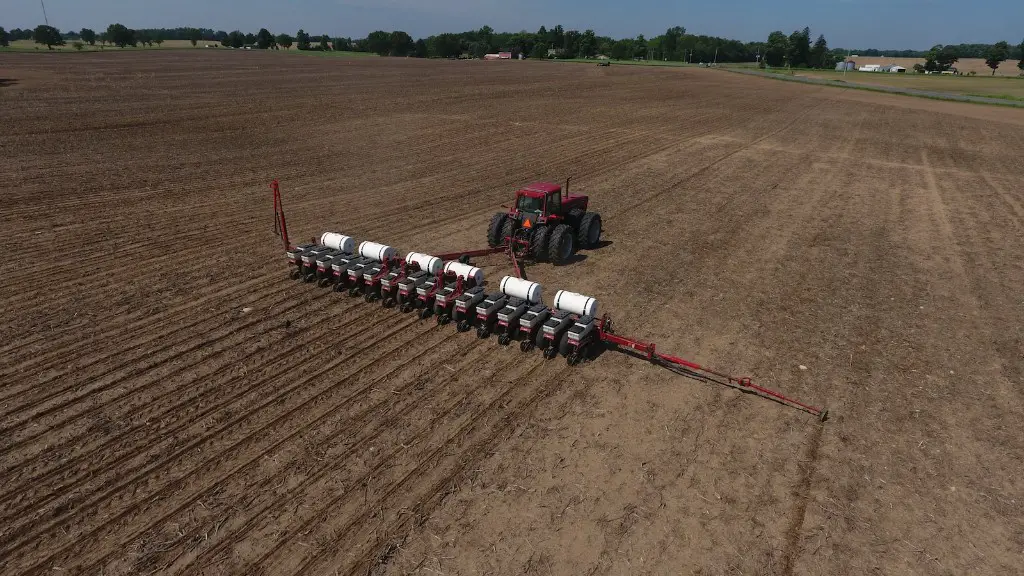Agriculture engineering is not a profession that is inherently difficult. It involves working with actors, plants, animals, and the environment, so it entails many different skills. To be successful in the field of agriculture engineering, one must have the analytical and problem solving skills necessary to make decisions that maximize outputs. They must also be creative, motivated, organized, reliable, and have exceptional communication skills. However, the most important skill required to excel in this kind of engineering is the ability to apply scientific principles to real-world situations. It is essential to understand the science behind the issues you are dealing with, as this guides your decision making process.
Agricultural engineering also requires specific technical knowledge and a general understanding of biological and ecological systems. Applicants must be able to integrate concepts of engineering, hydrology, biochemistry, soil science, agronomy, economics, and animal science into the desired solutions. Although this field may seem foreign to some, having a general understanding of the scientific principles can help when considering the development of solutions.
Agriculture engineering requires strong interpersonal skills. It is necessary to be able to work well with others in order to coordinate efforts and resolve conflicts. Additionally, it is vital to have the capacity to not only listen to others but to take the time to ask relevant questions in order to clearly communicate solutions.
Agricultural engineering is a challenging field and demands solutions that are both environmentally and economically responsible. You must be able to think holistically about solutions and plan for long-term impacts, rather than simply addressing immediate needs. As the environment is constantly changing, agricultural engineers must be able to anticipate and adapt solutions.
Agricultural engineering can also be mentally challenging. You must be able to think and solve problems quickly, and often independently. Being able to think critically and apply principles of scientific inquiry are essential tools for successful problem-solving.
In conclusion, while agricultural engineering is not an inherently hard profession, it requires numerous skills and competencies. One must have the capacity to think critically and to apply scientific principles to real-world problems. Additionally, strong interpersonal and technical skills are essential.
Technical Knowledge
Technical knowledge is fundamental to being successful in the field of agricultural engineering. The course work at the undergraduate level covers a variety of topics including hydrology, soil fertility, agronomy, crop and animal science, economics, and engineering principles. Understanding these topics helps to understand the science behind the issues at hand and can be used to develop effective solutions.
In agriculture engineering, technical knowledge often needs to be applied in an unconventional setting. Solutions must take into account competing demands from multiple stakeholders, including environmental and economic impacts. When developing solutions, one must consider these factors and create solutions that are both economically viable and environmentally responsible.
Agricultural engineers rely on technical knowledge in order to develop solutions that are both efficient and effective. Technology plays a large role in agricultural engineering, as many solutions are machinery-based. Knowledge of the types of machines available, as well as the available deals and discounts, can be very beneficial in finding the best solution.
Finally, the application of technology in agricultural engineering can mean integrating multiple systems. Mechanical, electrical, and computer systems must be coordinated and managed in order to work together efficiently. A strong understanding of each system can help in finding the solutions that are most efficient and effective.
Analytical Skills
Agricultural engineering requires analytical and problem-solving skills. In many cases, solutions must be developed in a short period of time, and there is often not one easy answer. To select the most appropriate solution, one must analyze multiple options and choose the one that is most cost-effective and applicable. This can be a daunting task, as agricultural engineering involves many different factors that must be considered for solutions to be successful.
There are many tools available to engineers in order to help in decision making. These tools allow for the analysis of data and information, as well as the comparison of different options. Understanding how to use these tools and how to interpret data is essential for successful problem-solving.
In addition to analytical skills, agricultural engineers must be comfortable with uncertainty. Decisions are often made in the face of limited information, and it is necessary to be able to recognize these situations and come up with solutions that are appropriate, despite a lack of knowledge.
Problem solving in agricultural engineering can be a challenging task. It requires the ability to analyze multiple options and select the most effective one. However, it is also necessary to be comfortable with uncertainty and to recognize when limited information is available. Understanding how to use the tools available and having a general understanding of the science behind the issues at hand can help agricultural engineers successfully tackle these issues.
Interpersonal Skills
Agricultural engineering requires strong interpersonal skills. Engineers must be able to effectively communicate with a variety of people, including farmers, suppliers, and government personnel. They must be able to effectively lead others, coordinate collaborative efforts, and resolve conflicts.
Additionally, it is important to be able to ask relevant questions and listen to others’ perspectives. Being able to interpret the needs of others and develop solutions that are tailored to their individual needs is a critical skill for agricultural engineers.
Finally, customer service is an essential component of successful agricultural engineering. Customers must be able to trust and rely upon the engineer and their solutions, and engineers must be prepared to go the extra mile in order to provide excellent service.
Interpersonal skills are an essential component of agricultural engineering. Engineers must be able to communicate effectively with a variety of people and must be comfortable leading, coordinating, and resolving conflicts. They must also be able to listen to and interpret the needs of those they are working with in order to provide tailored solutions. Finally, strong customer service is key to successful relationships with customers.
Motivation
Agricultural engineering requires motivation. Many of the tasks are challenging and require a great deal of hard work and dedication. Additionally, the solutions developed must often be implemented in a short time frame, so time management skills are essential.
Working independently can be difficult, so it is important to have the ability to stay focused and motivated without external sources. Certifications in the field can help to stay motivated, as these certifications can provide tangible goals to work towards. Additionally, working with colleagues or mentors can help to stay motivated and inspired.
Finally, as the field of agricultural engineering is constantly changing and evolving, it is necessary to stay up-to-date with current developments. This may involve reading reports and technical documents or attending conferences and workshops. Having the initiative to seek out relevant information shows dedication to the field and can be beneficial in staying motivated and inspired.
Agricultural engineering involves challenging tasks that require dedication and dedication. It is important to be motivated and focused in order to stay on track. Certifications can help provide tangible goals, and having mentors or colleagues to work with can help to stay motivated. Finally, having the initiative to seek out information pertinent to the field can help to stay inspired.
Organizational Skills
Organizational skills are an important part of successful agricultural engineering. Engineers must be able to organize and manage multiple tasks, prioritize appropriately, and coordinate efforts. In order to do this, it is necessary to have good record-keeping and project assessment skills. Additionally, the ability to delegate tasks and coordinate multiple people is key to successful projects.
Time management is also an essential organizational skill for agricultural engineers. Working on multiple projects at once can require managing a variety of deadlines and quickly adapting to unexpected changes. It is necessary to be able to prioritize tasks in order to make sure projects are completed on time and to the requested standards.
Agricultural engineering also involves dealing with large amounts of data, which requires strong organizational skills. Being able to effectively store, manage, and process data is essential for successful data analysis, which is key to successful problem-solving.
Organizational skills are essential for successful agricultural engineering. Engineers must be able to organize multiple tasks, delegate efficiently, and prioritize appropriately. Good record-keeping and project assessment skills are also important, as is being able to manage multiple projects and process large data sets. Finally, good time management is essential in order to complete tasks in a timely manner.




